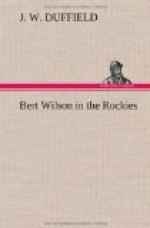“That’s the Little Big Horn River,” said Melton as they drew out on the other side. “Perhaps you fellows remember something that happened here a good many years ago.”
“What,” cried Bert. “You don’t mean the Custer Massacre?”
“That’s what,” returned Melton. “Right over there where the river bends was the place where Sitting Bull was encamped when Custer led the charge on that June morning. I’ve got to breathe the horses for twenty minutes or so, and, if you like, we’ll look over the field.”
If they would like! The boys thrilled at the thought. They had read again and again of that gallant and hopeless fight, where a thousand American cavalrymen led by Custer, the idol of the army, had attacked nine thousand Indians, and fighting against these fearful odds had been wiped out to the last man. In all the nation’s history no one, except perhaps Phil Sheridan and Stonewall Jackson, had so appealed to the imagination of the country’s youth as Custer, the reckless, yellow-haired leader in a hundred fights, the hero of Cedar Creek and Waynesboro and Five Forks, the Chevalier Bayard of modern times, “without fear and without reproach,” who met his death at last as he would have wished to meet it, in that mad glorious dash that has made his name immortal, going down as he had lived with his face to the foe. To these ardent young patriots the place was holy ground, and their pulses leaped and their hearts swelled as Melton pointed out the features of the field and narrated some of the incidents of that awful, but magnificent, fight. It was with intense reluctance that, warned by the gathering shadows, they tore themselves away.
“Can’t wait any longer now,” said Melton as they retraced their steps to the place where the horses were browsing; “but some day soon we’ll come down here early and spend the whole day. It won’t be any too long to get a clear idea of the fight and all that led up to it.”
The mustangs, refreshed by the rest, and feeling too that they were on the last stretch of their journey, needed no urging, and Melton gave them their head.
“Must be pretty near your place now, I suppose,” said Tom.
“Well, yes,” answered Melton, with a twinkle in his eyes; “been traveling on my lands for the last eight miles. House not more than five miles ahead.”
The boys gasped. It was something new to them to hear one speak as carelessly of miles as a farmer back East would speak of acres. Now they were getting some idea of what was meant when one spoke of the “boundless West.”
“Got to have room to stretch my arms without hitting anything,” went on Melton. “Of course, I don’t use much of it for farming. Just raise enough to take care of the table and the stock. But for grazing there ain’t any better pasture for cattle in the whole State of Montana.”
“Then all the cattle we’ve seen grazing by thousands for the last few miles belong to you?” asked Dick, as soon as he had recovered from his surprise.




